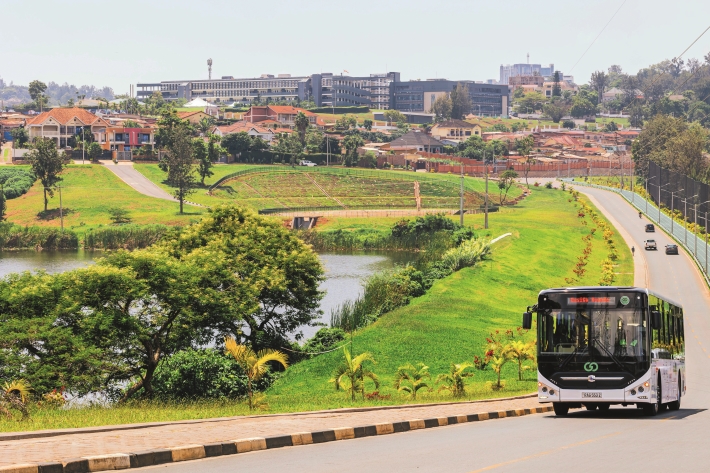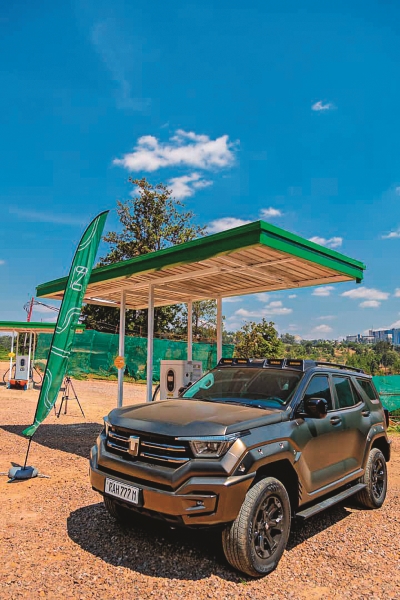|
||||||||||
| Home Top News Economy/Tech Culture/Sports China in Foreign Eyes Green Development Videos Intangible Cultural Heritages |
|
||||||||||
| Home Top News Economy/Tech Culture/Sports China in Foreign Eyes Green Development Videos Intangible Cultural Heritages |
| ChinAfrica |
| Sustainable Ride |
| Chinese electric vehicle makers fuel Rwanda’s drive for pollution-free transportation |
| By Jean d’Amour Mbonyinshuti | VOL. 16 September 2024 ·2024-09-02 |

A Chinese-made electric bus in Kigali, Rwanda (BASIGO RWANDA)
Amid a growing demand to electrify Rwanda’s public transport, companies are rushing into the sector to import electric vehicles (EVs) and related services from China.
IZI Electric is one of them. In early April, it delivered its first batch of five electric buses made by China’s automaker Zhongtong, each with a capacity of 60 passengers and equipped with a robust 130 kwh battery powerful enough to run on hilly roads.
“These buses were selected because they are suitable for Kigali’s landscape and road conditions, and will ensure reliable and efficient public transportation throughout the city,” said Alex Wilson, CEO of IZI.
Besides, IZI has introduced the first fast charging station in Rwanda, also imported from China. Located at Century Park in Kigali, the two 120-kw twin-gun charging piles are critical for the daily operation of the newly introduced buses.
“The charging facility is a vital part of our strategy to support not only our fleet but also private EV owners, enhancing the charging infrastructure in Rwanda,” Wilson added.
The buses require just over an hour for a full charge, which allows them to operate for a day. IZI’s charging station can also be used for a quick mid-day recharge when necessary. Additionally, these stations will soon open to a growing number of private EV owners, who can fully charge their vehicles in just 15 to 20 minutes.
Cost-efficient, accessible
IZI adopts the “pay-as-you-go” pricing model, which is highly cost-effective. Public operators such as Kigali Bus Services (KBS) have to pay $2,200 as a deposit and are provided with the buses and the services, and then are charged $0.5 per km under the pay-as-you-go model, which reduces operational costs by an average of 40 percent and raises profitability. This model includes comprehensive service packages covering vehicle servicing, insurance and training. On the contrary, if operators buy the buses in the market, it might cost them around $120,000 to $160,000 each.
Private EV owners will benefit from affordable charging at IZI’s stations as well, paying 350-400 Rwandan francs ($0.27-0.3) per kwh.
With the aim to boost e-mobility, IZI plans to import an additional 20 buses by October and aims to reach the milestone of 100 buses in 12 months. The company also intends to expand its charging network from one to five stations across Kigali, supporting the city’s growing EV ecosystem.
IZI currently works with KBS as a public transport operator, and is planning to join hands with other operators such as Volcano Express and Royal Express as well.
IZI is not the only such company operating in Rwanda. Before it entered the market, Kenyan company BasiGo, which has been assembling Chinese vehicles in Kenya, launched its business in Rwanda earlier in March.
The company started with four electric buses, and plans to import another 100 buses by March 2025, and 200 more in 2026. A fully charged bus can travel 300 km. Charging piles are installed at specific locations in the capital city.
BasiGo also uses the pay-as-you-go pricing model.
Public transport operators say they are ready to embrace the use of EVs as they could be more profitable while also protecting the environment with zero emissions.
Charles Ngarambe, CEO of KBS, said the business model of leasing could be profitable. “We believe the IZI model can be transformative for the profitability of our business and drive our expansion. We are ready to work with the company and use more electric buses to curb the emissions that pollute the air,” he said.

An IZI Electric charging facility in Kigali, Rwanda CENTURY PARK OF KIGALI)
More incentives
Rwanda also welcomed Hallo Life Ltd., a company that assembles motorcycles with supplies from China and sells them in Kigali. The company also operates other African countries such as Tanzania and Cote d’Ivoire, with plans to extend to Ethiopia, Uganda, Kenya and elsewhere.
According to its CEO Glory Lu, the company is dedicated to providing the best short-distance e-mobility solutions using Chinese technology. “Our motorcycles are cheap, with no fuel to emit gasses and no noise, and they require no maintenance,” he said.
So far, the company has sold more than 200 motorcycles, and more have been assembled. According to Lu, the assembling plant, which is located in Kicukiro District in the capital city, is ready to serve all clients as it has the capacity to produce hundreds of vehicles per day.
Rwanda is among the countries that have ambitious plans to transit to green transport. According to the Ministry of Infrastructure, the East African country plans to have 20 percent of its buses, 30 percent of its motorcycles and 8 percent of its cars powered by green energy by 2030.
In order to increase the uptake of EVs in the country, the government has introduced incentives for battery-powered EVs, plug-in hybrid EVs and hybrid EVs.
Companies manufacturing and assembling EVs in Rwanda can now enjoy a reduced income tax rate of 15 percent as well as a tax holiday, according to the Ministry of Infrastructure. Electricity tariff for charging stations is also capped at the industrial tariff rate for large industry category, while the private EV chargers benefit from a reduced tariff during the off-peak time.
Besides, EVs, spare parts, batteries and charging station equipment are treated as zero-VAT products. The government has also exempted import and excise duties on EVs, spare parts, batteries and charging station equipment, while the withholding tax of 5 percent at customs is also exempted.
These measures, according to the officials, are aimed at reducing carbon emissions by vehicles, which are one of the leading causes of air pollution. According to the statistics from the Ministry of Environment, 40 percent of the transport sector emissions in Rwanda are from buses, while road transport accounts for 13 percent of the country’s total emissions.
Chinese-made vehicles have an essential role in Rwanda’s pursuit of green transportation. The country now has more than 400 EVs, 3,000 electric motorcycles and 1,500 hybrid vehicles, the majority of which are Chinese-made, according to official figures.
|
||||||||||||
| About Us | Contact Us | Advertise with Us | Subscribe |
| Copyright Beijing Review All rights reserved 京ICP备08005356号-5 京公网安备110102005860号 |